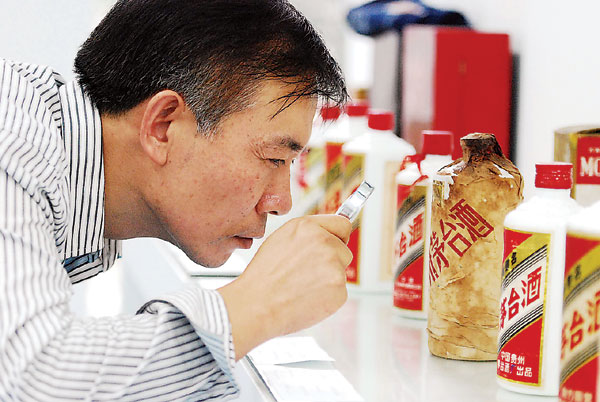Moutai aims high for global reach
 0 Comment(s)
0 Comment(s) Print
Print E-mail China Daily, March 11, 2012
E-mail China Daily, March 11, 2012
Having built a reputation as China's top liquor brand, Moutai is now aiming to become a world-famous drink.
|
|
|
A prospective buyer takes a closer look at a vintage bottle of Moutai during an auction in Nanchang, Jiangxi province last year. [Chinadaily] |
But he admitted the sales of Moutai products outside of China is still quite limited.
This was due in part to the difference in drinking habits. There is a greater choice of alcoholic strengths and flavors in other countries.
Ji, 73, has worked for the distilling company for nearly 50 years. He became chairman in 1998 and retired from the position last year.
The group aims to further increase its output to about 100,000 tons by 2015, from about 60,000 tons in 2011, he said. It will bring the group an income of 50 billion yuan (US$7.9 billion). The company saw an income of 23.7 billion yuan last year.
"If Moutai succeeds in the international market, it can set a good example for other Chinese liquor brands," said Liu Yuan, secretary-general of the China National Association for Liquor and Spirits Circulation.
Moutai's strategy is to promote itself together with traditional Chinese culture.
"Instead of selling the liquor alone, we will combine our products with the Chinese culture," Ji said.
Yi Jigang, the former chairman of liquor maker Guizhou Dongjiu, backed the strategy.
"It's vital you exploit the culture behind the product," he said.
"Moutai will get more recognition from Western consumers when it allows them to also get a taste of the rich Chinese culture behind the brand."
But Yi warned that Chinese liquor producers did not currently have the international marketing capability and would be greatly restricted if they relied too much on foreign distributors.
In the market at home, although Moutai enjoys a high degree of recognition and popularity, its image has been tainted by being associated with lavish lifestyles, including that of government hospitality.
The price of a 500 ml bottle of ordinary Moutai liquor is more than 1,500 yuan after it saw a series of recent price rises. During the Spring Festival, the price of a bottle rose to 2,300 yuan, almost the basic monthly salary of a production worker.
But Li Zhanshu, Party chief of Guizhou province, where the Moutai company is located, argued the high price of the drink was due to the marketing strategy.
"The public and government are both consumers in the market. There is demand from the government and we should not oppose such demand," Li told a news briefing on Wednesday during the National People's Congress session.
He added that if Moutai was banned in government banquets, some places might offer Chateau Lafite Rothschild instead, an imported French wine that is even more expensive.







Go to Forum >>0 Comment(s)